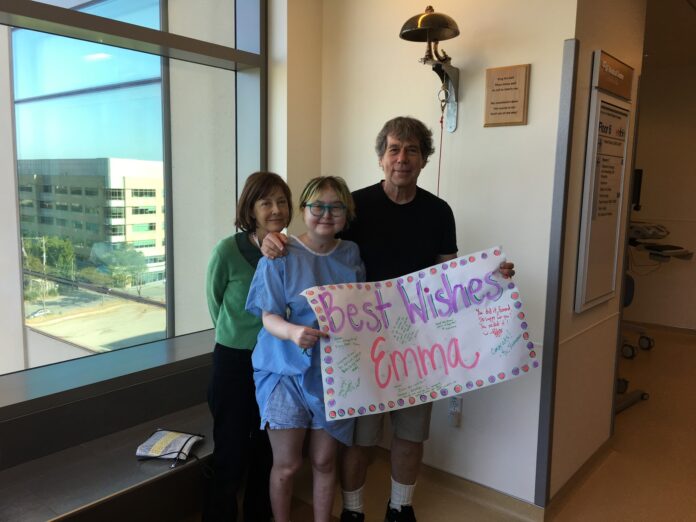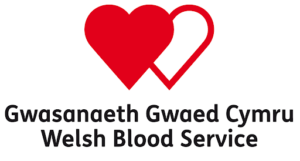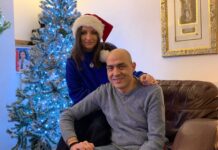More people than ever before can now join Welsh Blood Service’s bone marrow registry to help patients overcome blood cancers and blood disorders, in changes introduced to mark World Cancer Day (4 February).
Whilst previously only allowing 17 to 30-year-olds to join its Registry, the Welsh Blood Service is now enabling 16-year-olds to pre-register their interest to join and raising the upper age limit to 45-years-old for volunteers from a Black, Asian or Mixed heritage background.
The change has been well-received by former patients and survivors across the globe, including Emma Capps, an American who overcame a rare and life-threatening blood disorder thanks to receiving a stem cell (also known as bone marrow) donation from 33-year-old Welshman Chris Nunn from Bridgend.
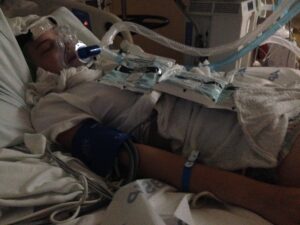
Emma, from California, USA, became severely ill in 2015 at the age of 18 years old and for years, her doctors struggled to detect what was causing her illness. Finally, Emma was diagnosed with a type of blood disorder called haemophagocytic lymphohistiocytosis (HLH). HLH is a life-threatening condition similar to leukaemia; with patients having to go through chemotherapy, immunotherapy, steroid treatment or a stem cell transplant, providing a suitable donor can be found.
Over 5,000 miles away in Wales a match was identified from a complete stranger, Chris, who donated his stem cells in May 2017, to help provide Emma with a lifesaving treatment to overcome her illness.
Emma went on to complete a dual honours degree programme, receiving a BA in Literary Arts from Ivy League, Brown University and an honours BFA in Illustration from the Rhode Island School of Design. Emma is now undertaking a PGCE in Art and Design in England at Cambridge University.
Speaking about her experience, Emma said: “A man I had never met was the only one who could save my life. None of my family members were eligible to donate, so I was placed on a worldwide registry of patients seeking a match – and thankfully, I found Chris halfway around the world in Wales!”
Only one in four patients will find a suitable match from a family member, meaning most patients depend on donations from unrelated volunteers on registries across the world.
Emma continued: “I didn’t squander this precious gift. I worked really hard to get my life back on track. Chris is the reason I am standing here today, having achieved all of these amazing things.
“These changes will make a real difference, and I hope by sharing my story more people will know just how important it is to join the Welsh Blood Service’s Registry.”
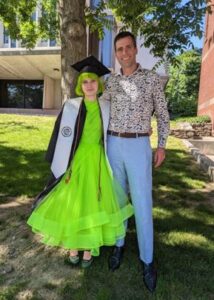
Explaining his motivations for signing up to donate his stem cells, Chris said: “My mum died of cancer when I was 12, so when the Welsh Blood Service came to our office and I heard how many different ways I could help people, it was something I knew I had to get involved with.
“I signed up as a stem cell volunteer when I was donating blood at a mobile clinic, but you don’t even need to be a blood donor anymore, you can sign up through a swab kit, delivered right to your door.
“It wasn’t until around 17 years later that I was contacted and told I was a match for someone in need.
“They said the patient was a 19-year-old female in America and it really hit home for me, my stepson was also 19 at the time. No family should have to go through what Emma’s family went through. I’d do it all again tomorrow if it meant helping someone else.”
After a donation, a two-year anonymity policy prevents donors and patients from sharing identifiable information about one another. In this time, Emma and Chris exchanged letters via the Welsh Blood Service, and eventually swapped contact details, starting a long relationship of email exchanges before they finally met last year in America.
Recounting his visit, Chris said: “The first time we met, Emma came running and screeching towards me before wrapping her arms around me. That was the moment it became clear what I had done, and I now count her as a member of my family. It was one of the most heart-warming experiences I have ever had.”
Despite over 40 million people being on the global stem cell register, three in ten patients still won’t find a match, and this statistic goes up to seven in ten for patients from Black, Asian, Mixed Race or Minority Ethnicity backgrounds.
Head of the Welsh Blood Service’s Registry, Christopher Harvey said: “The chance of being chosen as the perfect match for a patient anywhere in the world is extremely rare, but the opportunity to find a life-saving match increases as more and more donors sign up. This is especially important for people from a Black, Asian, Mixed Race or Minority Ethnicity background.
“Wherever you’re from, you could be the one and only person in the world who could be that match and save someone’s life. Whether you’re eligible to join, or know someone who is, please talk about this life-changing Registry and help give more patients a chance to overcome their illness.”
There are two ways to join the Welsh Blood Service’s bone marrow registry, by requesting a swab kit online or whilst giving blood. To support or sign up, visit www.welshblood.org.uk.
Help keep news FREE for our readers
Supporting your local community newspaper/online news outlet is crucial now more than ever. If you believe in independent journalism, then consider making a valuable contribution by making a one-time or monthly donation. We operate in rural areas where providing unbiased news can be challenging. Read More About Supporting The West Wales Chronicle

















